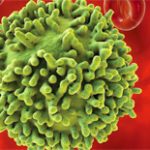As our understanding of regulatory T (Treg) cells expands, so does our appreciation that Treg cells are heterogeneous and capable of exerting influence beyond the immune system. A new study suggests that Treg cells and a growth factor (Amphiregulin) produced by these cells may play an important role in wound and muscle repair.
In a paper published last December in Cell, researcher Dalia Burzyn, PhD, of Harvard Medical School in Boston, and her colleagues describe a significant and persistent accumulation of Treg cells in damaged muscle days after injury that corresponds with a switch in the myeloid cell infiltrate from a proinflammatory to a proregenerative phenotype.1
In their research, the team performed microarray-based, gene-expression profiling of Treg cells and conventional CD4+ T cells from muscles and lymphoid organs. They report that muscle Treg cells are distinguished from splenic Treg cells in that the gene Satb1 is repressed, theoretically enhancing the suppressor activity of Treg cells in the muscle.
“We selected several of the genes upregulated in muscle Treg cells and confirmed their induced expression at the protein level by flow cytometry. Such an analysis also revealed muscle Tregs to be high level expressors of Helios and Neuropiplin and were therefore likely to be Treg cells exported as such from the thymus,” wrote the authors.
The T cell receptor (TCR) repertoires of injured-muscle and lymphoid-organ Treg cells also appear to be distinct. The investigators assessed clonality of the muscle Treg population by examining the TCR of individually sorted cells. They found that individual muscle Treg cells often had the same TCR. Thus, the rapid accumulation of Treg cells at the injury site appears to be the result of clonal expansion to an as-yet-unidentified antigen.
The team found that muscle repair after acute injury was impaired in the absence of Treg cells. They investigated this by using a strain of mice in which the diphtheria toxin receptor is expressed under the control of Foxp3 regulatory elements. They performed punctual depletion of Treg cells in these mice and documented a prolonged proinflammatory infiltrate and impaired muscle repair.
The investigators also report that muscle Treg cells expressed Amphiregulin, which improved muscle repair in vivo and acted directly on muscle satellite cells in vitro.
“When Tregs are depleted, the functionality of muscle progenitors is decreased and more fibrosis is observed. This is very interesting because it shows that Tregs can control immunological and nonimmunological processes,” wrote Dr. Burzyn in an e-mail to The Rheumatologist.
